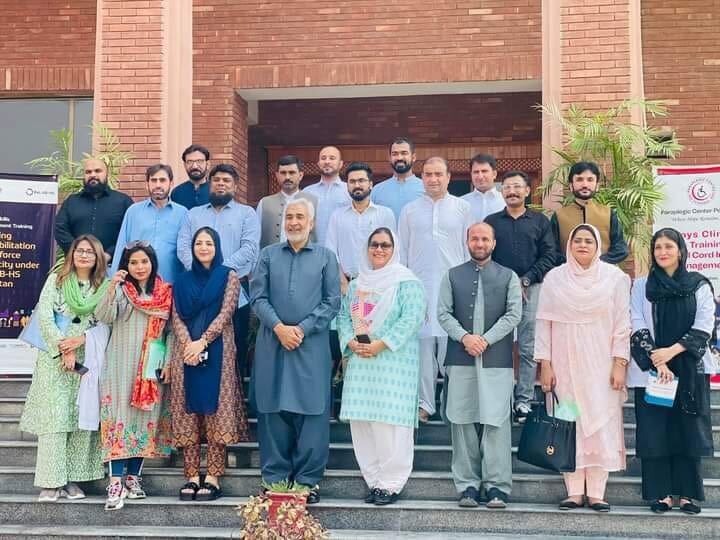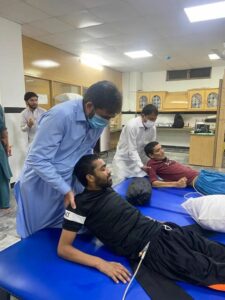Rehabilitation professionals from a variety of professions came together in Pakistan this month to practice hands-on skills and share their knowledge and experience in managing spinal cord injury (SCI) patients.
A practical skills training session on SCI was held at the Paraplegic Centre Peshawar (PCP) for 14 rehabilitation professionals from Khyber Pakhtunkhwa and Sindh provinces in Pakistan. This 3-day training was the first in-person event conducted in Pakistan as part of the ReLAB-HS Clinical Skills Training Programme and included physiotherapists, occupational therapists, and prosthetists/orthotists. It was hosted by local experts from the PCP, facilitated by Neelum Zehra, occupational therapist and Physiopedia Representative in Pakistan.

Prior to the practical training, all participants completed the online Physiopedia Plus Comprehensive Spinal Cord Injury Programme to cover the theoretical aspects of the training. The in-person meeting was then an opportunity to focus on practicing the technical and hands-on skills related to assessing and managing patients following SCI using the International Classification of Functioning, Disability and Health (ICF) model. Participants were able to prioritise practicing their skills through working with volunteer patients and experienced facilitators with access to equipment available at the PCP, the only centre of its kind in the region.
“It was a great learning experience, and I want to express my sincere gratitude to the facilitators and organising team. We successfully achieved our goals and gained valuable practical experience in interdisciplinary rehabilitation for spinal cord injury patients. I’d like to thank all the participants for the wonderful time we spent together, learning from each other and gaining insights into their work and field. “
 Participants particularly appreciated the opportunity to meet in-person (a rare occurrence in Pakistan, particularly across the provinces), giving them a multi-disciplinary perspective on their learning from the other rehabilitation professionals attending. In addition, they noted the collaborative atmosphere that grew from participating first in online mentoring sessions and getting to know each other during discussions in the Rehabilitation Community group prior to the meeting.
Participants particularly appreciated the opportunity to meet in-person (a rare occurrence in Pakistan, particularly across the provinces), giving them a multi-disciplinary perspective on their learning from the other rehabilitation professionals attending. In addition, they noted the collaborative atmosphere that grew from participating first in online mentoring sessions and getting to know each other during discussions in the Rehabilitation Community group prior to the meeting.
This very interactive training session was a successful example of a hybrid approach to interprofessional learning for clinical skills training of rehabilitation professionals, and follows similar in-person training sessions held in both Myanmar and Uganda this month.
This work is supported by the USAID funded Learning Acting Building for Rehabilitation in Health Systems (ReLAB-HS) project and is not possible without the generous and committed contribution of the Leahy War Victims fund.
ReLAB-HS is made possible by the generous support of the American people through the United States Agency for International Development (USAID) and is implemented under cooperative agreement number 7200AA20CA00033. The consortium is managed by prime recipient, Johns Hopkins Bloomberg School of Public Health.

